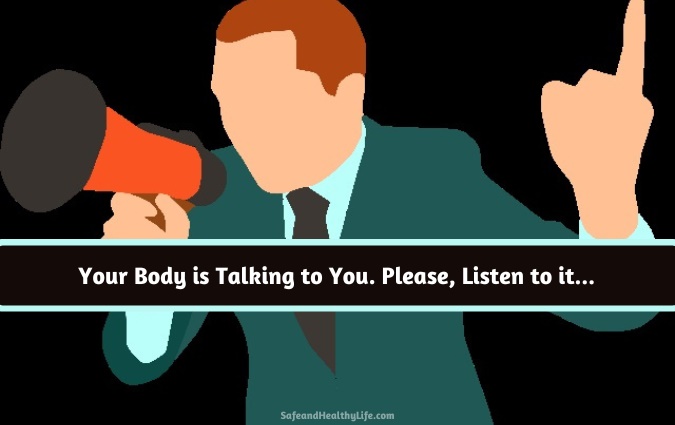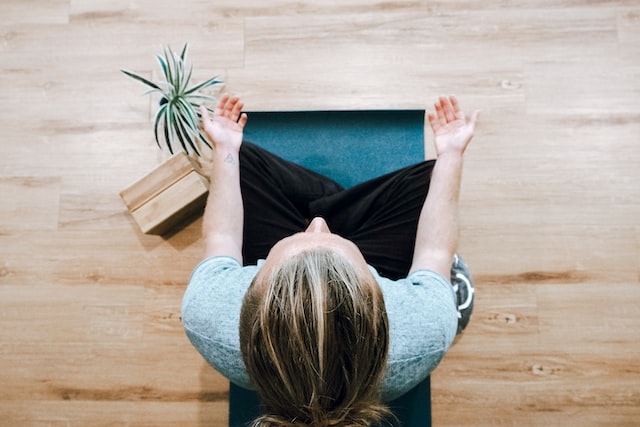Your Body is Talking to You. Please, Listen to it…

A well-known adage goes: “If you don’t listen to your body when it whispers, you will have to hear it scream”. So discomfort is your body’s way of communicating with you.
When was the last time you gave your body a chance to speak?
I don’t mean literally, but rather by means of impulses, sensations, or inner guidance.
Do you, for instance, occasionally notice tiny changes in your body?
How do you generally care for your body?
With kindness, nurturing, or disrespect?
It is not intended to make you feel bad, but rather to assist you in recognising your fundamental relationship to your body.
We constantly get messages, cues, and information from our bodies. It’s time to re-learn how closely the body and the mind are intertwined and reap the rewards of developing a relationship with our bodies and comprehending this effective channel of communication.

Photo Credit: Pixabay
We are rarely taught how to listen to the body, what it is saying, or what to learn in our modern, busy societies.
The idea that the body and the mind are interconnected in this way or that the body even has any kind of intelligence is frequently dismissed as an absurdity.
And is it any wonder that we are getting sicker and worse in a world where we are so busy, so distracted, and where we look to everyone and everything else for the answers?
Our body continuously takes care of us through breathing and heartbeat. These processes run continuously and effortlessly without any guidance from outside of us. Whether we are awake or asleep, they are precise and work as planned. The body selflessly gives so much of itself while making no demands.
When our bodies do communicate with us—say, through a headache or an ailing back—we typically block that communication with painkillers or other medicines, effectively telling our bodies to stop talking. The whisper is utterly ignored by us.
Similar to this, what do we do when we move or sit in a way that is uncomfortable? To feel more comfortable, we move. We disregard the murmur.
But what if you didn’t learn how to listen and avoid the allergen, causing those recurring headaches to be the result of an allergy that subsequently worsens later in life?
Second, if you only sat and moved in a way that felt comfortable, you wouldn’t be using and stretching as many small but crucial muscles in your body.
Over time, these muscles become very stiff and/or weak, which teaches us to move and hold our bodies in an unbalanced manner that can later result in severe pain and injury.
You must learn the language your body uses to communicate with you because it whispers to you. This is why we need to establish a strong connection with our bodies and pay attention to their cues.
I will admit that if we lead a fast-paced existence, it can be challenging to understand what our bodies are trying to tell us.
However, this can be a reminder to take it slowly, tune into our bodies more frequently, and pay attention to our calm intuitive instincts.
The body uses subtle undertones to convey. If we ignore the signals, the body will take whatever action is required to grab our attention, which could lead to discomfort, ailment, or disease.
Similar to this, a lot of individuals today wear gadgets that transmit information on how their bodies are functioning. They are constrained, though, in that they cannot discern the emotions the body is experiencing.
This is so that the body can register feelings before the brain even gets a chance to. It has an energy field that can detect minute alterations in our surroundings and inform us of them.
Learn to heed your body’s signals. Talk to it frequently and express your gratitude for the laborious effort it does. It’s not quite as absurd as it seems.
One of the best ways to establish a closer connection is to express gratitude to your body for the ongoing job it does. Your body serves as a vehicle through which you experience life.
It contains all of your feelings, scars, and trauma. Because the body may have vital signals it wants to relay, we should pay attention to it when it speaks.
Comprehending your body’s signals provides you with actual insight and understanding of what is good and incorrect for you.
That is not anything you are thinking, but your mind translates the physical sensations you experience into spoken language.

Photo Credit: Unsplash
With two M’s; mindfulness and Meditation.
The more attentive we can be, the better able we are to hear what is happening right now, and the more we meditate, the better able we are to comprehend what is happening.
Anybody who properly meditates will tell you that developing a deeper connection with oneself has a significant good effect on one’s physical health, including deep prayer practitioners, yoga masters, scholars, monks, successful businesspeople, moms, sons, and uncles.
The reason for this, in my opinion, is that the body responds by letting go of the discomfort when the meditator has fully listened to it and understood its whispers (or screams)—the lesson has been learned.
How to practice mindfulness and meditation
There are many methods to research mindfulness and meditation; here are a few ideas:
- Put your phone away and take a stroll. Try to limit your attention to what you can see right now. This is my morning meditation, which I perform before I see anyone, check my phone, or even brush my teeth. If you can perform this barefoot and feel the connection to the soil, all the better.
- Play a sport you enjoy; Feel the grass, sand, or mud between your toes. You won’t need to ‘learn’ how to be aware since you’ll be so focused.
- Join a group for prayer or meditation.
- Get started with your meditation practice by downloading an app.
- Put the stimulants down. Everything that contains coffee, alcohol, and some medicines also have an impact on how the brain functions, suppressing the part of the brain that naturally knows how the body communicates with.
- Have you ever heard of somebody who drinks coffee before meditating? In my opinion, no. In reality, coffee is frequently used to “get us going” or to motivate us to complete a task. I’m sure we’d soon realise how much we truly didn’t want to do that thing. That’s us telling the inner communication to “shut up” by consuming coffee. It implies that you’re not acting in a way that benefits you.
We can begin to recognize our inner strength once we begin to realise that the body is communicating with us. As our confidence grows, we are less likely to seek outside guidance or assistance.
We are aware of our capacity for self-analysis. We can give ourselves strength and assistance. We may feel more in charge, less disoriented, and less dependent on the help of others.
We can learn not to run from discomfort, not to be afraid of it, or to avoid it, but to be glad for its lesson and welcome these signals by quietly being aware and open to receiving them.
It becomes a lot friendlier idea and a safer place to live in when we see discomfort as signals of communication from something that wants us to be totally well and to thrive.
Since we only have one body for the duration of our lives, wouldn’t life be better if we weren’t afraid of it or afraid to use it?
Wouldn’t it be a lovely life if we accepted our bodies, allowed ourselves to feel secure in them, and moved fearlessly as toddlers do?
When we do listen, we frequently discover that the agony leaves as quickly as it appeared. Demonstrating to us that nothing need be feared or avoided and that all that was needed was a brief moment of awareness.
Our bodies occasionally just have one message: “Stop, slow down, or you will damage yourself.” “Stop, listen, you’re doing something you don’t want to do”. “It doesn’t serve you” is the most typical message. Put an end to it.
It does require time and practice, but the payoff is independence and the benefits of healing and confidence.
You are much more knowledgeable about your body than I ever will be. I can declare with absolute certainty that you already know everything there is to know; all you need to do is learn how to listen.
People are only your guides; the solution is not found outside of yourself.
About The Author:
Rehmatullah Khan: By education, I have completed my Master’s degree in Soil Sciences. However, after 16 years of service as a Soil Chemist in the largest fertilizer industry in Pakistan, I entered the online world of knowledge, education, and services. Based on my personal interest, expertise, and abilities.

